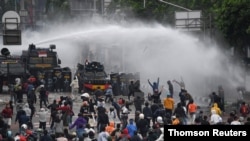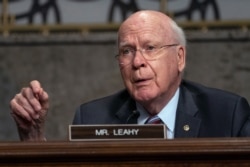At least a dozen non-government organizations are protesting the U.S. decision to grant Indonesian Defense Minister Prabowo Subianto a visa to visit Washington for talks despite his alleged involvement with human rights violations.
Prabowo is scheduled to meet with U.S. Defense Secretary Mark Esper and the Chairman of the Joint Chiefs of Staff Mark Milley on Friday. Indonesian Minister of Defense spokesperson Dahnil Simanjuntak told VOA's Indonesian Service that Esper issued the invitation to Prabowo, onetime chief of the Kopassus, an Indonesian Army (TNI) special forces unit accused of human rights violations by rights groups and Indonesia's National Commission on Human Rights. Prabowo was first denied entry to the U.S. in 2000 due to allegations of human rights abuse in East Timor, West Papua and during 1998 student protests in Jakarta.
A spokesman for the U.S. State Department echoed the statement on Wednesday that "the U.S. Department of Defense plans to host Minister Prabowo at the Pentagon on Friday [Oct. 16] to further strengthen the U.S.-Indonesian bilateral relationship." Some topics for discussion between the two officials include regional issues, defense trade, security cooperation, military-to-military activities, and the response to COVID-19.
Amnesty International USA on Tuesday sent a letter to U.S. Secretary of State Mike Pompeo protesting Prabowo’s visit. It was signed by Amnesty International Indonesia, Commission for Missing Persons and Violence, Public Interets Lawyer Network, Asia Justice and Rights, Committee for Solidarity Action for Munir, Imparsial, Public Virtue Institute, Setara Institute, Indonesia Corruption Watch, Jakarta Legal Aid Institute (LBH), Institute for Public Studies and Advocacy and LBH Press in Indonesia.
“Prabowo Subianto is a former Indonesian general who has been banned, since 2000, from entering the U.S. due to his alleged direct involvement in human rights violations,” the letter said. It continued, “The State Department’s recent decision to lift the ban on Prabowo Subinato is an abrupt, complete reversal of a longstanding U.S. foreign policy which has been in place for 20 years. … The invitation to Prabowo Subianto must be rescinded if it purports to provide him immunity for the atrocity crimes of which he is accused.”
Prabowo has repeatedly denied involvement in rights abuses.
“If he does indeed travel to the U.S, the U.S. government will have the obligation under, at least, article 5 (2) of the Convention Against Torture to investigate, and if there is sufficient admissible evidence that he is criminally responsible for torture, bring him to trial or extradite him to any other country willing to exercise jurisdiction over the alleged crimes,” the letter said.
The letter continued, saying that “allowing Prabowo to freely travel to the U.S. to meet with senior U.S. government officials may violate the Leahy Laws and would be catastrophic for human rights in Indonesia.”
The Leahy Law prohibits the U.S. Department of State and the U.S. Department of Defense from providing military assistance to security forces units that violate rights with impunity. It is named for Senator Patrick Leahy, a Vermont Democrat who sponsored the legislation.
On Tuesday, Leahy said in a statement, “Indonesian Minister of Defense Prabowo has been credibly implicated in gross violations of human rights, including kidnapping, torture, and disappearances, and under our law he is ineligible to enter this country.”
Leahy continued, “By granting him a visa, the President and Secretary of State have shown once again that for them ‘law and order’ is an empty slogan that ignores the imperative of justice. The State Department should apply the law and deny him a visa, and the Pentagon should reaffirm its commitment to the rule of law.”
East Timor and Indonesia Action Network (ETAN), a New York-based organization that advocated for East Timor's independence issued a petition to reject Prabowo’s visit, calling him a “serial rights violator … not worthy of (a) U.S. visit.” The group pointed out that U.S. law allows for the prosecution of non-U.S. citizens who have engaged in torture.
Analysts think it is unlikely that legal action will take place during Prabowo’s visit. “It's likely that he has diplomatic immunity and therefore can't be charged with a crime or can't be arrested while he's in the U.S.” said Ilya Somin, a professor at the Antonin Scalia Law School at George Mason University in Fairfax, Virginia.
“I think this visit's really been choreographed at the highest levels and the minister is going to be greeted with great respect in Washington,” said Brian Harding a former Pentagon official now with the U.S. Institute of Peace.
Pentagon spokesman John Supple confirmed on Oct. 9 that the U.S. Department of Defense will receive Prabowo at the Pentagon to strengthen bilateral defense relations between the United States and Indonesia.
The U.S. State Department said, “Visa records are confidential under U.S. law; therefore, we cannot discuss the details of individual visa cases. Whenever an individual applies for a U.S. visa, a consular officer reviews the facts of the case and determines whether the applicant is eligible for that visa based on U.S. law."
The U.S. State Department emphasized that "we consistently advocate for respect for human rights and fundamental freedoms with all of our defense partners, including Indonesia."
A spokesperson for the Indonesian Minister of Defense Dahnil Simanjuntak told VOA last week the country does not establish military alliances with any country, "but maintains the same closeness with all countries. Defense Minister Prabowo Subianto, has been actively conducting defense diplomacy with various countries including America.”
Yuni Salim of VOA Indonesia, Carla Babb and Cindy S. Spang contributed to this report.





